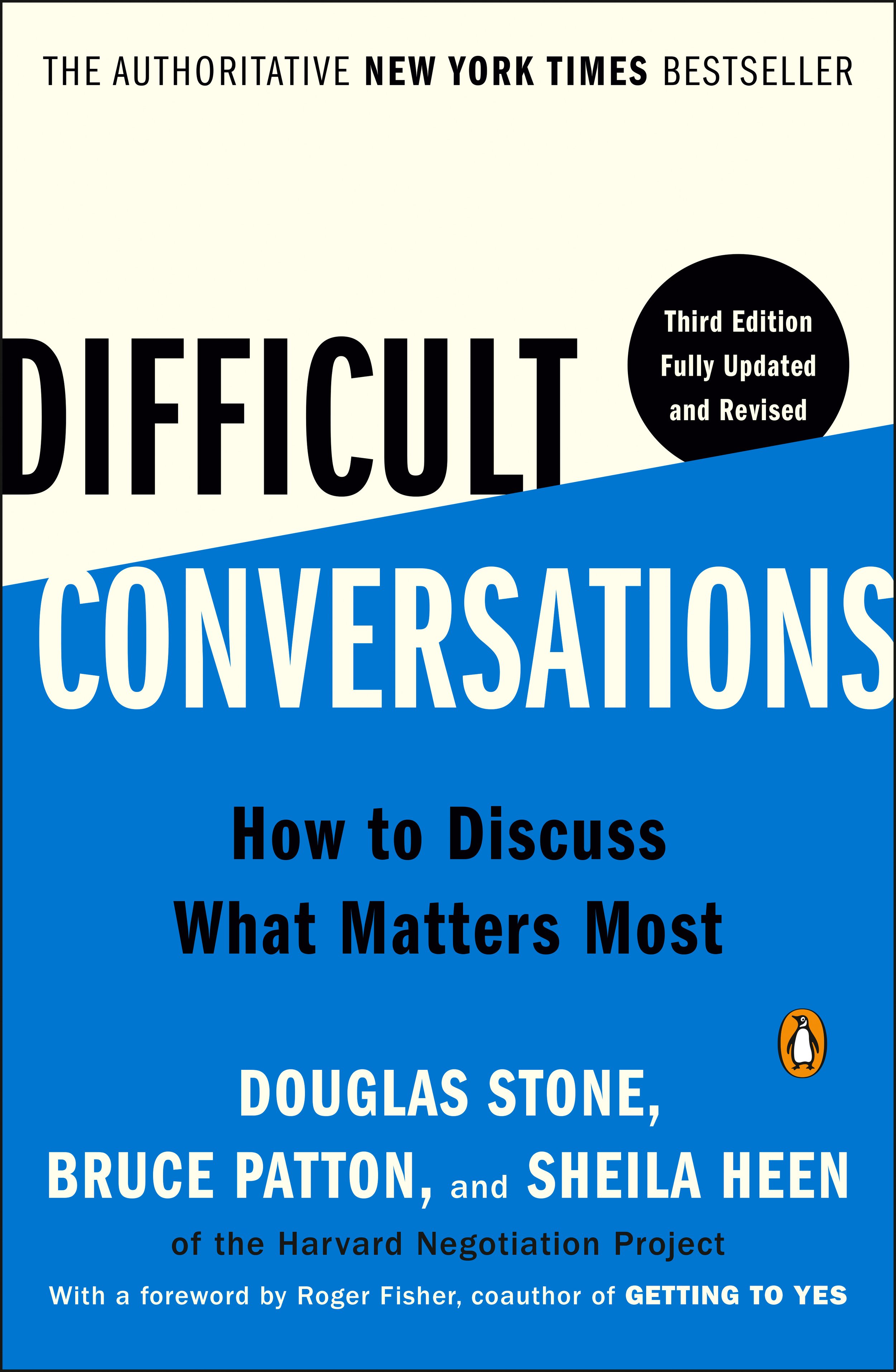Difficult Conversations
(How to Discuss What Matters Most)
Whether we’re dealing with an under-performing employee, disagreeing with our spouse about money or childrearing, negotiating with a difficult client, or simply saying “no,” or “I’m sorry” or “I love you,” we attempt or avoid difficult conversations every day. No matter how competent or experienced we are, we all have conversations that cause anxiety and frustration.
This book can help. Based on fifteen years of research, Difficult Conversations is a New York Times Business bestseller, and has become the go-to book on communication in the workplace. It’s taught at business schools, law schools, in psychology programs, in executive coaching and therapy programs.
Its reach has been gratifying. Palestinian educators built communication programs around the Arabic edition; Israeli mediators used the Hebrew edition to help with external and internal negotiations; Postwar Hutu and Tutsi leaders in Burundi have come together to develop a conflict resolution program for their youth using the French edition. Global organizations are using it to manage the challenges of working within and across cultures. At twenty-five and languages and counting, it has even been downloaded, we’re told, onto the International Space Station.
The book has been used to train oil-rig operators in the North Sea, Iñupiat negotiators in the oil-rich Northern Slope of Alaska, and business leaders at Saudi Aramco. It’s been used at the Boston Area Rape Crisis Center and the headquarters and field offices of UN-AIDS. Doctors, nurses, and administrators in hospitals across the United States have used it to deliver better patient care and more humane workplaces. Within the U.S. government, it’s distributed at the Department of Justice, the IRS, the Federal Reserve, and the Postal Service. During one administration, the White House made it required reading for its top sixteen hundred political appointees.
And we were delighted to learn that it was named one of the top 75 Penguin classics of all time.
What people are saying about Difficult Conversations:
“ STONE, PATTON, AND HEEN ILLUSTRATE THEIR POINTS WITH ANECDOTES, SCRIPTED CONVERSATIONS AND FAMILIAR EXAMPLES IN A CLEAR, EASY-TO BROWSE FORMAT.”
—PUBLISHERS WEEKLY
“ THE CENTRAL INSIGHTS OF DIFFICULT CONVERSATIONS SO RESONATE WITH COMMON SENSE THAT IT IS EASY TO OVERLOOK JUST HOW REMARKABLE OF A BOOK IT IS . . . A MUST-READ.”
—HARVARD NEGOTIATION LAW REVIEW
“ EXAMPLES MORE CLEAR-HEADED AND ADVICE MORE PRECISE THAN WE’VE SEEN BEFORE.”
—DALLAS MORNING NEWS
“ STONE, PATTON, AND HEEN HAVE WRITTEN AN EXTREMELY CLEAR AND UNPRETENTIOUS EXPOSITION OF HOW TO DEVELOP EFFECTIVE COMMUNICATION SKILLS AND A GUIDE TO ACHIEVING OPENNESS AND CONSTRUCTIVE OUTCOMES IN DIALOGUE. . . THIS BOOK IS, AND PROBABLY FOR SOME TIME TO COME WILL BE DEFINITIVE.”
—SOUTHERN COMMUNICATION JOURNAL
“ ON MY THIRD READING. HALF THE PAGES ARE DOG-EARED. THIS IS A MIND-BOGGLINGLY POWERFUL BOOK. FOR LIFE.”
— TOM PETERS.
“ THE ONLY PEOPLE WHO SHOULDN’T READ DIFFICULT CONVERSATIONS ARE THOSE WHO NEVER WORK WITH PEOPLE, ANYWHERE.”
— PETER M. SENGE, BESTSELLING AUTHOR OF THE FIFTH DISCIPLINE
“ A USER-FRIENDLY GUIDE TO MASTERING THE TALKS WE DREAD . . . A KEEPER.”
— FAST COMPANY MAGAZINE
“ EMOTIONAL INTELLIGENCE APPLIED TO LIFE’S TOUGHEST MOMENTS.”
—DANIEL GOLEMAN, BESTSELLING AUTHOR OF WORKING WITH EMOTIONAL INTELLIGENCE
“ HOW DO YOU CONFRONT YOUR EX-SPOUSE WHO’S LATE PICKING UP THE KIDS? HOW DO YOU TELL A CLIENT THEIR PROJECT TOOK LONGER THAN EXPECTED AND THE BILL IS TWICE AS HIGH? HOW DO YOU SAY ‘I’M SORRY’? START BY PICKING UP DIFFICULT CONVERSATIONS.”
—CITIZEN
“ [DIFFICULT CONVERSATIONS] WILL BE APPRECIATED BY READERS WHO WISH TO IMPROVE ORAL COMMUNICATION IN ALL ASPECTS OF THEIR DAILY LIVES.”
—LIBRARY JOURNAL
